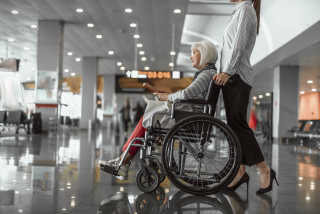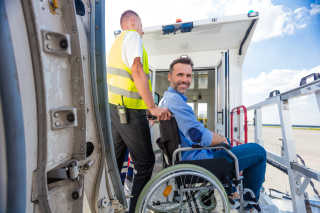Need special assistance during airport screening,
Unfortunately, whenever we fly we are subjected to searches to make sure we don't pose a security risk, and these searches can be a major source of anxiety for travelers with disabilities or other medical conditions. Fortunately, assistance is usually available when passing through screening. So let's look into the options, and help you travel with minimal worries.
- Is special screening assistance available for travelers in the USA?
- What rules apply to screening for wheelchair users?
- How to find out more about screening or make an assistance request
- How to prepare for a visit to US airports if you have mobility issues
Is special screening assistance available for travelers in the USA?
Screening is always annoying, whether you have a disability or not, but it can be doubly distressing for those who have medical implants or accessories attached (such as colostomy bags), or those who struggle to mobilize and cannot present their clothing or body for security checks.
However, there are ways to minimize the hassle involved, and help should be available - particularly when passengers pass through screening stations.
Under US Department of Transportation (DOT) guidelines, passengers with disabilities are guaranteed a number of rights relating to their passage through airports. Generally speaking, the core principle is that requests for help should always be answered, and as quickly as possible.
Assistance is available for passengers from the moment they enter terminals to the point they take their seats. Passing through security screening is a key part of the process, and special assistance can be requested to make these checks as simple and hassle-free as possible.
What rules apply to screening for wheelchair users?
Before we get onto assistance requests, it's handy to cover how security checks actually work for wheelchair users.
Most importantly, wheelchair users don't need to stand or leave their chairs during screening. And wheelchair users also don't need to pass through the metal detectors at screening stations.
Instead, TSA staff can provide a "pat down" check. This can be carried out privately, should always be done by an officer of the same gender as the passenger, and should be done sensitively, without causing undue distress. There may be delays as officers are made available, but in theory, passengers should be able to pass screening without complications.
Problems can sometimes arise, though. For instance, passengers may have limited mobility, but be asked to raise their arms. Or they may have medical devices attached which make searches problematic. That's why in-person assistance becomes so important. Helpers can act as a liaison with TSA officers and smooth out any difficulties.

How to find out more about screening or make an assistance request
The primary point of contact for travelers who need to arrange assistance throughs screening is the TSA Cares service.
Set up by the Transportation Security Administration, this helpline is accessible for all travelers. It provides basic information and assurance, and also hooks travelers up with personal assistants at specific airports. This makes it a good first port of call when arranging help with screening.
The number to call is (855) 787-2227, and passengers are advised to get in touch at least 72 hours before traveling. Otherwise, individual airlines should be available to provide information about the services they provide, so don't be shy about making contact.
How to prepare for a visit to US airports if you have mobility issues
Aside from calling TSA Cares, travelers may with disabilities may wish to sign up for pre-check schemes that cover security checks. For example, TSA PreCheck is a popular option with disabled travelers, as it provides them with "trusted traveler" status. This means that their wheelchairs or other devices can be pre-cleared, and there are fewer security checks when entering airports.
If you rely on a guide dog when traveling, it may be a good idea to get in touch with The Guide Dog Foundation. The GDF works with the TSA, and can provide demonstration videos about how to accustom your dog to airport procedures.
Finally, some passengers may want to contact their physicians to secure an official letter describing their condition and any medication they need to carry. This just removes any ambiguity and helps TSA officers do their job, while reducing anxieties for travelers themselves.
Overall, flying shouldn't be stressful for anyone, least of all those with disabilities. So contact TSA Cares and make sure that you have as much assistance as you need.

Do you want to start planning your next trip? Find your flight tickets straight away at BudgetAir.com.